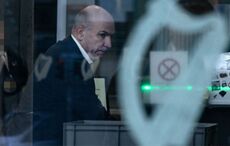Phil Farrington, the last Irish soldier to be pardoned for fighting with the British in WWII, passed away last year at 94 years of age. This is his story.
When Phil Farrington returned to Ireland from fighting the Nazis in WWII with the British Army, he was arrested and imprisoned.
Farrington was one of an estimated 5,000 men with the Irish Defense Forces (IDF) who went AWOL (absent while on leave) in order to join the Allies in WWII. Because Ireland had chosen to remain neutral during WWII (or, as the Irish government termed it, “the emergency,”), these men were viewed as deserters when they returned home to Ireland.
In 1945, then-Taoiseach (Prime Minister) Eamon de Valera even passed an emergency order listing the consequences for “desertion in a time of national emergency” – these included dismissal from the IDF, revoking of pensions and a block on their holding state jobs.
The soldiers were not officially pardoned for their “desertion” until 2013.
Farrington, believed to be the last survivor of the groups who fought in WWII, died last weekend at a veterans’ hospital in Dublin. He was 94-years-old.
The BBC reports that he first joined the Royal Sussex regiment. When he returned to Ireland while on leave he was imprisoned in Cork.
His experience in prison was told in the book “Spitting on a Soldier’s Grave,” by Robert Widders. "We were in jail through the winter," he said.
"It was freezing cold without any bedding or heating. And once a week we'd all be hosed down with cold water. Sometimes we had to stand to attention for hours in the freezing cold."
He also said that the prisoners were forbidden from talking to each other and fed very little.
When he was released he was allowed to re-join the IDF, but he again went AWOL. He then joined the Pioneer Corps in Germany. He aided in the liberation of the infamous Bergen-Belsen concentration camp.
It wasn’t until Queen Elizabeth’s historic visit to Ireland in 2011 that a campaign started in earnest to see the Irish soldiers pardoned. In 2012, the Irish government apologized for the way the Irish soldiers had been treated, and in May 2013 the Dáil (Irish parliament) passed an official pardon for all of the soldiers.
The pardon was announced during a commemoration ceremony at the Islandbridge war memorial in Dublin. Farrington laid a wreath during the ceremony.
Peter Mulvaney, the man who led the Irish Soldiers Pardoned campaign from 2011 to 2013, told the BBC he learned of Farrington’s death “with regret.”
Farrington's grandson Patrick Martin said that his grandfather was always reluctant to talk about his service.
"He did not want to talk about it. I grew up with him and constantly inquired about the war, what it was like – like any young kid would be interested to hear,” he told the Irish Examiner. “But we really were told nothing.”
* Originally pubished in May 2015.




Comments